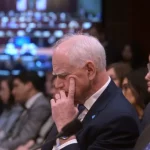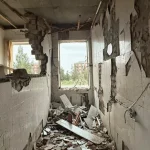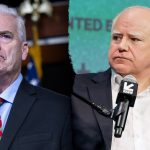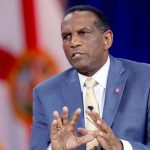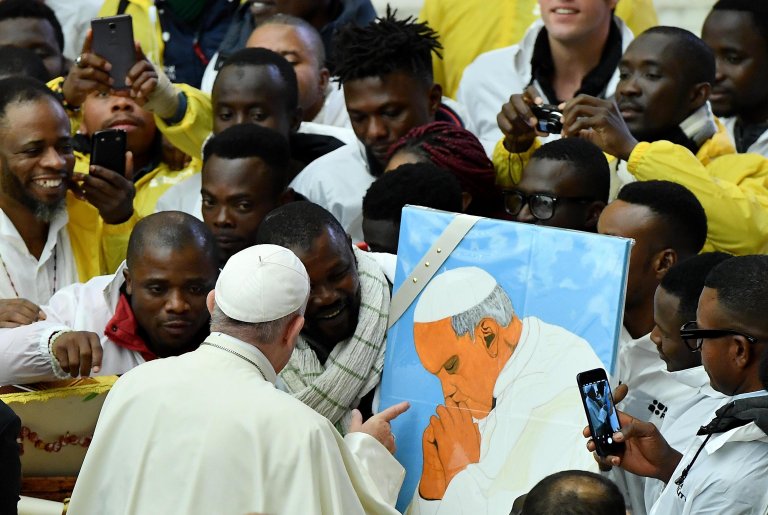Pope Francis said Monday that migrants represent all those who are excluded, oppressed, and marginalized in today’s society.
In his annual message for the World Day of Migrants and Refugees, the pope offered a series of reflections revolving around the theme: “It is not just about migrants.”
It’s not just about migrants, he said. It’s about “our fears”; it’s about “charity”; it’s about “our humanity”; it’s about “seeing that no one is excluded”; it’s about “putting the last in the first place”; it’s about “the whole person, about all people”; it’s about “building the city of God and man”; it’s about “all of us, and about the present and future of the human family.”
“The most economically advanced societies are witnessing a growing trend towards extreme individualism which, combined with a utilitarian mentality and reinforced by the media, is producing a ‘globalization of indifference,’” the pope said.
Walz-Ellison administration ‘enabled’ Minnesota’s fraud scandal: Guy Benson
NYC Dept of Education employee arrested, charged with murder of Bronx father
Savannah Guthrie returns to ‘Today’ show studio for first time since mother went missing
Iran widens regional war with first strike into Azerbaijan
Tom Emmer calls for Tim Walz, Keith Ellison to ‘serve jail time’ if fraud coverup allegations are true
Republican Rep Burgess Owens to retire from Congress when term ends
VIDEO: College Basketball Ref Knocked Out Cold When Players Turn Violent on Court
DOJ Ends Investigation Into Autopen Scandal With Zero Charges, Grand Juries, or Indictments
The ‘woo-woo’ philosophy of Trump’s surgeon general pick
Illegal’s dragging of ICE agent shows the exact danger the officer who shot Renee Good feared, expert says
The Iran Strikes Have Flooded X with So Much AI Disinformation That I Went Crawling Back to Cable News
‘Blankies,’ ICE tactics and luxury jets: Top moments from Noem’s House testimony
Op-Ed: America’s Education Crisis, and How to Solve It
Second suspect arrested after NYC snowball fight sends 2 police officers to hospital
DOJ quietly closes autopen investigation targeting Biden and aides
“In this scenario, migrants, refugees, displaced persons and victims of trafficking have become emblems of exclusion,” he said. “In addition to the hardships that their condition entails, they are often looked down upon and considered the source of all society’s ills.”
“That is why it is not just about migrants,” he said. “When we show concern for them, we also show concern for ourselves, for everyone; in taking care of them, we all grow; in listening to them, we also give voice to a part of ourselves that we may keep hidden because it is not well regarded nowadays.”
In his message, the pope reiterated his conviction that resistance to mass migration is fueled by fear.
“The signs of meanness we see around us heighten our fear of ‘the other,’ the unknown, the marginalized, the foreigner,” he said. “We see this today in particular, faced with the arrival of migrants and refugees knocking on our door in search of protection, security and a better future.”
These doubts and fears “condition our way of thinking and acting to the point of making us intolerant, closed and perhaps even – without realizing it – racist,” he said. “In this way, fear deprives us of the desire and the ability to encounter the other, the person different from myself.”
Walz-Ellison administration ‘enabled’ Minnesota’s fraud scandal: Guy Benson
NYC Dept of Education employee arrested, charged with murder of Bronx father
Savannah Guthrie returns to ‘Today’ show studio for first time since mother went missing
Iran widens regional war with first strike into Azerbaijan
Tom Emmer calls for Tim Walz, Keith Ellison to ‘serve jail time’ if fraud coverup allegations are true
Republican Rep Burgess Owens to retire from Congress when term ends
VIDEO: College Basketball Ref Knocked Out Cold When Players Turn Violent on Court
DOJ Ends Investigation Into Autopen Scandal With Zero Charges, Grand Juries, or Indictments
The ‘woo-woo’ philosophy of Trump’s surgeon general pick
Illegal’s dragging of ICE agent shows the exact danger the officer who shot Renee Good feared, expert says
The Iran Strikes Have Flooded X with So Much AI Disinformation That I Went Crawling Back to Cable News
‘Blankies,’ ICE tactics and luxury jets: Top moments from Noem’s House testimony
Op-Ed: America’s Education Crisis, and How to Solve It
Second suspect arrested after NYC snowball fight sends 2 police officers to hospital
DOJ quietly closes autopen investigation targeting Biden and aides
“Migrants, especially those who are most vulnerable, help us to read the ‘signs of the times,’” he said in conclusion. “Through them, the Lord is calling us to conversion, to be set free from exclusivity, indifference and the throw-away culture.”
While the pope and many European bishops have focused on open-heartedness in welcoming migrants, two African bishops — a Nigerian and a Guinean — have spoken out against mass migration, insisting that it is detrimental to their people.
Nigerian Cardinal John Onaiyekan, the archbishop of Abuja, said earlier this month that mass migration out of his country is a sure sign that political leadership has failed.
“Authorities should make Nigeria home. Same should be applicable to other African countries,” he said.
Having visited Italy and seen the number of Nigerian prostitutes on the streets of Rome and other cities as a result of mass migration, the cardinal said he was ashamed.
Walz-Ellison administration ‘enabled’ Minnesota’s fraud scandal: Guy Benson
NYC Dept of Education employee arrested, charged with murder of Bronx father
Savannah Guthrie returns to ‘Today’ show studio for first time since mother went missing
Iran widens regional war with first strike into Azerbaijan
Tom Emmer calls for Tim Walz, Keith Ellison to ‘serve jail time’ if fraud coverup allegations are true
Republican Rep Burgess Owens to retire from Congress when term ends
VIDEO: College Basketball Ref Knocked Out Cold When Players Turn Violent on Court
DOJ Ends Investigation Into Autopen Scandal With Zero Charges, Grand Juries, or Indictments
The ‘woo-woo’ philosophy of Trump’s surgeon general pick
Illegal’s dragging of ICE agent shows the exact danger the officer who shot Renee Good feared, expert says
The Iran Strikes Have Flooded X with So Much AI Disinformation That I Went Crawling Back to Cable News
‘Blankies,’ ICE tactics and luxury jets: Top moments from Noem’s House testimony
Op-Ed: America’s Education Crisis, and How to Solve It
Second suspect arrested after NYC snowball fight sends 2 police officers to hospital
DOJ quietly closes autopen investigation targeting Biden and aides
“To tell you bluntly I’m ashamed, I’m ashamed,” he told the BBC. “I’m moving through the streets of Rome, Milan, Naples and I see my daughters on the street on sale.”
“I’m ashamed and I stop and even greet some of them — you can’t even engage them in conversation because they were brought out of the village illiterates. All they learn and all they know on the streets of Italy is what they need for this business — I’m ashamed.”
According to reports, some 80 percent of Nigerian women who have arrived on Italian shores wind up in prostitution, usually by force, and currently one of every two prostitutes in Italy is Nigerian. Many young Nigerian women are enticed into traveling to Italy with promises of honest work only to find that they are expected to sell themselves on the streets.
Onaiyekan’s words on immigration echoed those of Guinean Cardinal Robert Sarah, the head of the Vatican’s liturgical department, who said last month that the Church should not be encouraging migration.
It is wrong to “use the word of God to promote migration,” he said, and using the Bible to encourage migration is a “false interpretation.” It is better “to help people flourish in their culture than to encourage them to come to Europe,” he said.
Walz-Ellison administration ‘enabled’ Minnesota’s fraud scandal: Guy Benson
NYC Dept of Education employee arrested, charged with murder of Bronx father
Savannah Guthrie returns to ‘Today’ show studio for first time since mother went missing
Iran widens regional war with first strike into Azerbaijan
Tom Emmer calls for Tim Walz, Keith Ellison to ‘serve jail time’ if fraud coverup allegations are true
Republican Rep Burgess Owens to retire from Congress when term ends
VIDEO: College Basketball Ref Knocked Out Cold When Players Turn Violent on Court
DOJ Ends Investigation Into Autopen Scandal With Zero Charges, Grand Juries, or Indictments
The ‘woo-woo’ philosophy of Trump’s surgeon general pick
Illegal’s dragging of ICE agent shows the exact danger the officer who shot Renee Good feared, expert says
The Iran Strikes Have Flooded X with So Much AI Disinformation That I Went Crawling Back to Cable News
‘Blankies,’ ICE tactics and luxury jets: Top moments from Noem’s House testimony
Op-Ed: America’s Education Crisis, and How to Solve It
Second suspect arrested after NYC snowball fight sends 2 police officers to hospital
DOJ quietly closes autopen investigation targeting Biden and aides
The cardinal denounced the Church’s push for migration into Europe in powerful language, insisting that most immigrants wind up in Europe “without work or dignity” and assume the condition of slaves.
“Is that what the Church wants?” he asked, adding that the Church should not support “this new form of slavery that is mass migration.”
Several days later, the cardinal went still further, saying that a Church of migration and ecology is “of interest to no one” and that it risks becoming just another NGO if it focuses on these “horizontal” issues rather than preaching Jesus Christ.
Story cited here.

